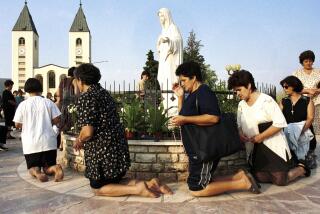Dissent in the Church: 2 Views on Vatican Instruction : CON: It shows the shift to a more conservative view of the church.
- Share via
The instruction indicates a continuing shift to a more conservative and authoritarian understanding of the Catholic Church. It fits into the pattern of many recent Vatican declarations and actions.
The vast majority of contemporary Catholic theologians have recognized at times the legitimacy of theological dissent from some non-infallible church teachings--that is, those teachings not at the core of faith.
The instruction disagrees. Dissent, which is described as “public opposition” to the teaching office of the church and includes organized dissent and the use of the mass media, is forbidden.
A Catholic theologian who, after a loyal effort, cannot accept a non-infallible or unchangeable teaching is to make known to church authorities one’s difficulties, with a prayerful certainty that truth will prevail.
The description of dissent is a caricature. The instruction does not mention dissent in theological journals and books, and therefore appears not to accept it.
The instruction is a return to the church before the Second Vatican Council of the mid-1960s. In the 1950 encyclical, Humani Generis , Pope Pius XII declared that whenever the Pope goes out of his way to speak on a disputed issue it is no longer a matter for free debate among theologians. The Second Vatican Council explicitly rejected such wording in its discussions on the church.
In 1968, U.S. Catholic bishops recognized the legitimacy of public theological dissent from non-infallible teaching under three conditions: the reasons are serious and grave; the teaching office is not impugned, and no scandal is given.
The possibility of such dissent is necessary for the good of the church itself. Theology systematically and thematically studies the faith and life of the Christian community and tries to understand the word and work of Jesus in the light of the ongoing circumstances of time and space.
This attempt to understand more adequately will at times take the form of dissent. Theologians will obviously make mistakes, but theological interpretation, including the possibility of such dissent, serves the good of truth and of the church.
Thanks in part to theological dissent, church teaching has changed on a number of positions over the centuries; e.g., the right to silence; slavery; the procreative intention in marriage; religious freedom; freedom of conscience; interest on loans; critical biblical scholarship; the Catholic Church, and salvation.
Dissent has a long track record in the church going back to St. Paul publicly disagreeing with St. Peter at Antioch. The Catholic Church would have been much better off if more dissenters had protested the Crusades, the witch hunts, the failure to recognize local liturgical customs, the exploitation of native peoples, and, above all in our time, the Holocaust.
What will happen?
There are many similarities to the crackdown by the Vatican less than 100 years ago that condemned Americanism, modernism and critical biblical scholarship. But today it will be difficult to put the toothpaste back into the tube. Unfortunately, the credibility of the church will suffer.
Why are we Catholics who firmly believe that faith and reason cannot contradict one another still so fearful of the struggle and search for truth? Even the Vatican recognizes that we are dealing with matters that are fallible and reformable.
Curran was barred from teaching theology at the Catholic University of America in Washington, after his published views in the areas of sexual ethics--especially birth control, abortion, divorce and homosexuality--were censured by the Vatican in 1986. He then taught social ethics at USC until recently, when he starting teaching theology at Auburn University.
THE ISSUE How much can a Roman Catholic theologian disagree with the Pope? A recent instruction from the Vatican proclaimed that theologians have no right to dissent publicly from official church teachings, even those not considered infallible or based on divine revelation. The Times asked two Catholic theologians to present their differing views on the controversial issue. From time to time, those involved in religious issues will be asked to speak out on their ideas.
More to Read
Sign up for Essential California
The most important California stories and recommendations in your inbox every morning.
You may occasionally receive promotional content from the Los Angeles Times.













